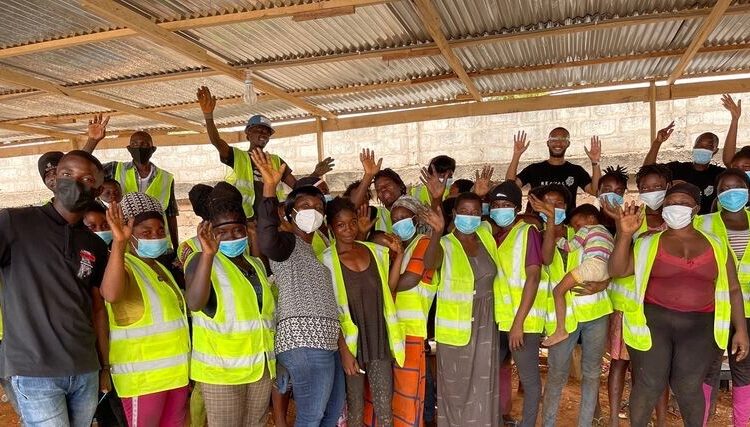How Ghanaian Entrepreneurs Are Reframing Problems As Opportunities
It’s easy to look at the world around us and see only problems.
Annually, the world generates 2 billion tonnes of municipal solid waste, with at least 33% of that ending up in the environment.
We have seen a significant rise in air pollution recording an estimated 7 million deaths yearly worldwide. 100 million marine lives get lost due to plastic pollution in our oceans and the recent global pandemic hit has left 131 million people without jobs and classified as poor, meaning that they live on two U.S. dollars or less daily.
These dire warnings sound an alarm for immediate action to protect the most vulnerable.
The list of complex issues is overwhelming, and it is understandable that people disengage from issues that feel outside of their control. Not so social entrepreneurs.
In Ghana, there exist a group of purpose-led businesses that see opportunities where others see problems and who have come up with innovative products and business models to solve some of the toughest social and environmental challenges.
Here we share four inspiring initiatives that we at Footprints Africa have had the privilege to work with, as part of our mission to prove business can be a force for good. These companies have reinvented the role of business in society and in so doing are addressing the waste management crisis, climate change, soil degradation, income inequality and so on…
Championing women in Waste Management – EVOLVE RECYCLING
Women play a critical role in waste management supply chains but, despite taking on the most dangerous and unsanitary roles, they receive a much lower income working as waste pickers, aggregators, sorters and machine handlers.
Enter Evolve Recycling, led by a female entrepreneur driven to empower informal workers, in particular the female waste pickers who supply them plastic for recycling. Evolve have piloted a new model, creating a network of 25 women waste picker groups averaging 5 members.
They support these women to self-organise, providing training and access to transportation. In addition, they hope to further boost the women’s incomes by trialling new equipment that will add value to the plastic material they are processing.
Product Innovation – PYRAMID
Pyramid Recycling began as an informal outfit, recovering plastic waste.
The founder was deeply frustrated that the plastic supposedly being recycled was turned into black plastic bags which quickly find their way back into the streets, choking up gutters.
He wanted to design products that would keep plastic in use and avoid waste entirely and so developed his own machinery to recycle plastics into products such as curtain ropes and chair fittings (‘chair shoes’).
These are sold across the region in Ghana, Ivory Coast, Togo and Burkina Faso. More ambitiously, Pyramid has successfully tested an innovation they call “wood plastics” to produce an alternative for wood in construction.
They hope this will reduce deforestation and both recover plastic waste and conserve Ghana’s forests. They recycle PET, LDPE, HDPE, PS, GPPS and PVC into plastic products.
Business model innovation- SAFISANA
Safisana was conceived to solve the overlapping challenges of poor handling of faecal and other organic waste, expensive and harmful chemical fertilisers and unreliable energy. The company designs, constructs, and operates a waste-to-energy anaerobic digestion plant. They combine organic waste from food markets and local abattoirs with faecal matter from urban slums to produce biogas, soil conditioner and irrigation water. They have their own nutrient-rich organic fertiliser brand, ‘Asaase Gyefo’ (‘Soil Saviour’), which they both sell and use to produce seedlings. A significant portion of revenue comes from selling electricity generated from captured methane to the National power grid.
Pioneering household waste segregation – JEKORA VENTURES
Jekora Ventures is the first and only Ghanaian waste management company offering recycling services to clients through its solid waste source segregation programme.
They have worked to expand their segregation programme to over 800 households without tax incentives to support the development of this critical infrastructure.
Given Accra’s landfill is at capacity, it is critical to find a way of diverting waste and capturing the value of discarded materials. Jekora incentivises their clients to segregate waste efficiently in recyclable streams by giving discounts on their monthly bills. by giving discounts on their monthly bills.
Employing circular approaches through food waste – KUKUN
Where some see waste, Kukun sees value. This food business is trialling an approach that will use food scraps and waste from their kitchens and the local community to test and run a community compost plant.
They are collaborating with a local NGO, Hipsters by Nature, to provide waste segregation facilities and training for community members, in the hope of reducing their waste bills and generating shared value.
This is a wonderful example of a business considering what resources or facilities it has that can support society for mutual benefit. Compost generated will be used to boost Kukun’s green gardens initiative, the community urban gardens and sold to potential buyers.
These are only a few examples of the many revolutionary initiatives using their business models to transform the environment and the communities around them in Ghana.
Whilst it adds complexity to take on such thorny challenges, these businesses show that it leads to mutual benefit with their community, stronger brand recognition, improved relationships across their supply chains and more resilience in the face of uncertainty.
Learning from these role models, the future, we hope, can only be one that is inclusive, regenerative, and self-sustaining.
Footprints Africa advances sustainable, scalable, and inclusive approaches for the development of African economies.
Footprints Africa is registered in the UK and Ghana and exists for public benefit. Do you feel inspired to contribute and help Footprints Africa take their work to the next level?
Kindly send an email changemakers@footprintsafrica.co or read more about their work and impact at www.footprintsafrica.com.


